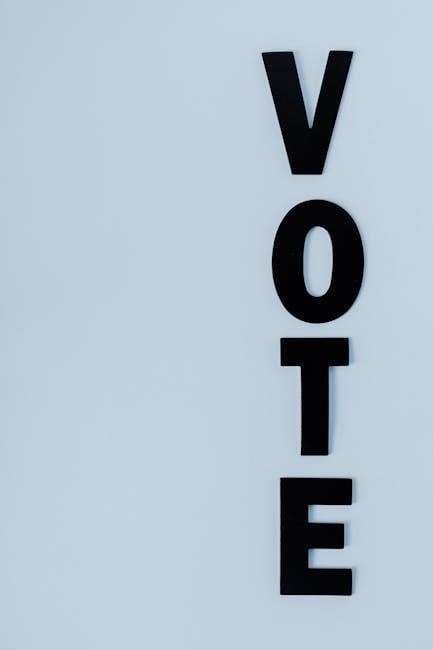Exploring the examination of flawed arguments within social justice movements, this section introduces the concept of logical fallacies, emphasizing the balance between equality and individuality, while promoting critical thinking and evidence-based discourse to address societal inequities effectively.
1.1 Overview of Social Justice and Its Objectives
Social justice seeks to promote fairness and equality in society by addressing systemic disparities and advocating for the rights of marginalized groups. Its primary objectives include dismantling structures that perpetuate inequality, ensuring equitable access to resources, and fostering inclusive policies that empower all individuals. Rooted in ethical principles, social justice aims to create a society where opportunities are not limited by race, gender, class, or other identity factors. It emphasizes collective responsibility and the redistribution of privileges to achieve balance. However, critics like Thomas Sowell argue that well-intentioned policies may sometimes lead to unintended consequences, highlighting the need for evidence-based approaches to avoid exacerbating inequalities. By focusing on systemic change, social justice strives to build a more equitable world for future generations.
1.2 The Role of Critical Thinking in Social Justice
Critical thinking is essential in social justice to identify and challenge flawed arguments that hinder progress. It enables advocates to analyze evidence, question assumptions, and avoid logical fallacies, fostering more informed and effective strategies. By evaluating claims objectively, critical thinking helps distinguish between valid concerns and emotional appeals, ensuring that solutions are grounded in reality. It also promotes constructive dialogue, allowing for the consideration of diverse perspectives without resorting to personal attacks or oversimplifications. Cultivating this skill is vital for creating policies that address inequalities without perpetuating harm, as highlighted by scholars like Thomas Sowell, who stress the importance of balancing empathy with rational analysis in pursuit of social justice. Ultimately, critical thinking strengthens the foundation of any movement striving for equity and fairness. It ensures that efforts are both impactful and ethical, fostering long-term positive change. By encouraging open-minded inquiry and intellectual rigor, critical thinking empowers individuals to contribute meaningfully to the advancement of social justice, leading to more equitable and just societies.

Defining Social Justice and Fallacies
Social justice seeks fairness and equity in society, addressing systemic inequalities. Fallacies in this context are flawed arguments undermining progress, often rooted in emotional appeals rather than evidence-based logic.
2.1 What is Social Justice?
Social justice encompasses the pursuit of equity, fairness, and dignity for all individuals, particularly marginalized groups. It addresses systemic inequalities through policies and advocacy, aiming to redistribute resources and opportunities. However, critics argue that well-intentioned initiatives can lead to unintended consequences, such as reverse discrimination or merit-based disparities. Thomas Sowell, in his analysis, highlights the importance of evidence-based approaches to avoid perpetuating inequalities under the guise of equality. Social justice seeks to create a more inclusive society but must navigate the complexities of human differences and the potential for misapplication of its principles.
2.2 Understanding Logical Fallacies in Social Contexts
Logical fallacies often emerge in social justice debates, undermining constructive dialogue. These fallacies include strawman arguments, false dichotomies, and appeals to emotion, which distort reasoning. For instance, attributing extreme views to opponents or framing issues as binary can polarize discussions. Emotional appeals bypass rational analysis, leading to impulsive decisions. Recognizing these fallacies is crucial for fostering informed discourse. Thomas Sowell’s work emphasizes the need for critical thinking to avoid such pitfalls, ensuring that social justice advocacy remains grounded in evidence and logic rather than flawed reasoning. Addressing these fallacies promotes more effective and equitable solutions to societal challenges, encouraging a balanced approach to addressing inequalities without compromising intellectual rigor.
Historical Context of Social Justice Movements
Tracing the evolution of social justice from historical movements, this section explores how past struggles shaped current concepts and critiques, revealing recurring fallacies in advocacy efforts.
3.1 Key Historical Movements and Their Impact
Historical movements, such as the Civil Rights Movement and women’s suffrage, laid the groundwork for modern social justice. These movements aimed to address systemic inequalities and promote fairness. However, critics like Thomas Sowell argue that some policies stemming from these movements, such as affirmative action, have led to unintended consequences. For instance, Sowell contends that race-based admissions policies can create disparities in opportunities, highlighting the potential for fallacies in the pursuit of equality. These historical efforts, while well-intentioned, sometimes overlooked individual differences, leading to critiques of systemic approaches to justice. Understanding these historical contexts is crucial for evaluating current social justice strategies and their potential flaws. Additionally, movements like labor rights and environmental justice have further shaped the discourse, emphasizing the need for balanced approaches that consider both equity and merit.
3.2 Evolution of Social Justice Concepts
Over time, social justice concepts have expanded from addressing basic equality to tackling systemic inequities and intersectionality. Early movements focused on legal and political rights, while modern approaches incorporate economic, cultural, and environmental dimensions. Critics argue that this evolution has sometimes led to overgeneralization, ignoring individual differences. Thomas Sowell highlights how well-intentioned policies, like affirmative action, can create new disparities. The shift from equality of opportunity to equality of outcomes has sparked debates about merit and fairness. Despite these critiques, the evolution reflects a broader understanding of justice, aiming to address nuanced forms of marginalization. However, it also introduces complexities that require careful consideration to avoid unintended consequences and logical fallacies in policymaking and advocacy.

Common Fallacies in Social Justice Discourse
Thomas Sowell examines how fallacies like strawman arguments, false dichotomies, and appeals to emotion undermine social justice debates, often leading to flawed conclusions and polarized discussions.
4.1 Strawman Argument in Social Justice Debates
A strawman argument distorts opponents’ positions, simplifying or misrepresenting them to make them easier to refute. In social justice discourse, this fallacy often involves caricaturing nuanced views, leading to polarized debates. For instance, advocating for equality is sometimes misrepresented as demanding uniformity, ignoring individual differences. This fallacy stifles constructive dialogue and fosters division. Thomas Sowell highlights how such misrepresentations undermine efforts to address real inequities, as they shift focus from substantive issues to defending exaggerated claims. Recognizing strawman arguments is crucial for fostering meaningful conversations and ensuring that social justice initiatives remain grounded in reality rather than misplaced generalizations.
4.2 False Dichotomy and Binary Thinking
False dichotomy, or binary thinking, presents complex issues as simplistic, two-sided choices, often framing them as entirely good or evil. In social justice debates, this fallacy oversimplifies nuanced problems, such as reducing discussions on equality to us-versus-them narratives. For instance, policies aimed at addressing disparities are sometimes portrayed as either completely equitable or entirely oppressive, ignoring potential middle ground. This binary approach alienates those who hold moderate views and hinders collaborative problem-solving. By fostering an “either-or” mindset, false dichotomies prevent nuanced understanding and effective solutions, reinforcing polarization rather than fostering unity and progress in social justice efforts. Addressing this fallacy requires embracing complexity and encouraging multifaceted dialogue.
4.3 Appeal to Emotion and Its Consequences
Appeal to emotion is a fallacy where arguments are supported by emotional manipulation rather than logical reasoning. In social justice discourse, this fallacy often involves using heartfelt stories, vivid imagery, or morally charged language to sway opinions. While emotions can highlight injustices, reliance on them can obscure factual analysis and lead to impulsive decisions. For instance, advocating for policies based on emotional narratives may result in oversimplified or ineffective solutions. This fallacy undermines critical thinking by prioritizing feeling over evidence, potentially harming the credibility of social justice movements. Recognizing and addressing emotional appeals is crucial for fostering rational, constructive dialogue and ensuring that justice is rooted in both compassion and reason.
4.4 Slippery Slope Fallacy in Policy Discussions
The slippery slope fallacy occurs when an argument suggests that a relatively small first step will inevitably lead to a series of extreme consequences without evidence. In social justice policy discussions, this fallacy often arises when opponents of a policy claim it will result in dire, far-reaching outcomes. For example, advocating for affirmative action might be met with claims that it will lead to widespread reverse discrimination. This fallacy discourages nuanced dialogue by focusing on hypothetical extremes rather than the policy’s actual potential. It can hinder compromise and prevent policies from being enacted, as fear of imagined consequences overshadows evidence-based analysis. Addressing this fallacy requires distinguishing between plausible outcomes and unsubstantiated fears, ensuring decisions are grounded in reality rather than speculation.
4.5 Ad Hominem Attacks in Social Justice Dialogues
Ad hominem attacks in social justice dialogues involve discrediting an argument by targeting the character, identity, or personal circumstances of the person making it, rather than addressing the argument itself. This fallacy often emerges in heated debates, where opponents are dismissed as racist, privileged, or ignorant, rather than engaging with their viewpoints. Such attacks stifle constructive dialogue and undermine the credibility of social justice movements by reducing complex issues to personal attacks. Critics like Thomas Sowell argue that this approach alienates potential allies and fosters division. Addressing ad hominem attacks requires a focus on the argument’s substance, promoting respectful dialogue, and emphasizing evidence over personal criticism to advance meaningful social justice discourse.
4.6 Confirmation Bias in Social Justice Advocacy
Confirmation bias in social justice advocacy refers to the tendency to favor information that aligns with pre-existing beliefs while ignoring or discrediting contradictory evidence. This fallacy can lead advocates to selectively present data, cherry-pick statistics, or interpret events in a way that reinforces their narrative. For instance, focusing solely on disparities without considering broader contexts can distort perceptions of systemic issues. Thomas Sowell critiques how this bias can result in overgeneralizations and misguided policies. Addressing confirmation bias requires advocates to engage with diverse perspectives, question assumptions, and seek evidence-based solutions. By doing so, social justice efforts can become more inclusive and effective, fostering nuanced discussions rather than polarized debates.
Addressing Fallacies in Social Justice
Addressing fallacies in social justice requires fostering critical thinking, promoting constructive dialogue, and relying on evidence-based arguments to ensure equitable and informed advocacy, free from logical errors.
5.1 Strategies for Recognizing Logical Fallacies
Recognizing logical fallacies in social justice discourse requires a combination of critical thinking and media literacy. One effective strategy is to identify common fallacies such as strawman arguments, slippery slopes, and ad hominem attacks. Encouraging skepticism and questioning assumptions can help uncover flawed reasoning. Additionally, promoting open dialogue and fostering empathy allows for more nuanced discussions. Educators and advocates should emphasize the importance of evidence-based arguments and teach individuals to distinguish between emotional appeals and logical reasoning. By cultivating these skills, participants in social justice conversations can engage more constructively, avoiding fallacies that often derail progress. This approach ensures that discussions remain focused on facts and equitable solutions rather than misguided assumptions.
5.2 Promoting Constructive Dialogue and Debate
Promoting constructive dialogue in social justice discussions involves fostering an environment of mutual respect and active listening. Encouraging diverse viewpoints and challenging assumptions without personal attacks can lead to more meaningful exchanges. Educating participants about logical fallacies and their impact on discourse is crucial. Additionally, fostering empathy and understanding helps bridge divides, allowing for more nuanced discussions. By emphasizing evidence-based arguments and avoiding emotional appeals, conversations can focus on solutions rather than polarization. Encouraging open-mindedness and willingness to revise opinions based on new information further enhances dialogue. These strategies help create a space where constructive debate thrives, leading to more equitable and informed outcomes for all parties involved.
5.3 The Importance of Evidence-Based Arguments
Evidence-based arguments are foundational to constructive social justice discourse, ensuring that claims are grounded in verifiable data rather than emotion or assumption. By relying on empirical evidence, advocates can build credible and persuasive cases, reducing the likelihood of logical fallacies. This approach fosters accountability, as arguments must withstand scrutiny and opposing viewpoints. Evidence-based reasoning also promotes policies that address root causes of inequality, rather than superficial symptoms. Moreover, it encourages a culture of intellectual honesty, where arguments are evaluated on their merit rather than emotional appeal. Ultimately, prioritizing evidence strengthens the legitimacy of social justice initiatives, ensuring they are both effective and just.
The Role of Education in Mitigating Fallacies
Education plays a vital role in mitigating fallacies by fostering critical thinking, media literacy, and analytical skills, empowering individuals to identify and address flawed arguments effectively.
6.1 Teaching Critical Thinking Skills
Critical thinking is essential for identifying fallacies in social justice discourse. By teaching students to analyze arguments, evaluate evidence, and question assumptions, education helps them discern logical fallacies. This skill enables individuals to engage in constructive debates, fostering empathy and understanding. Encouraging open-mindedness and reflection, critical thinking promotes a deeper comprehension of complex social issues. It equips learners with the tools to differentiate between well-reasoned arguments and emotional appeals, fostering a more informed and discerning society. Ultimately, integrating critical thinking into education empowers individuals to contribute meaningfully to social justice discussions, ensuring that advocacy is grounded in logic and evidence rather than fallacious reasoning.
6.2 Encouraging Media Literacy and Skepticism

Media literacy and skepticism are vital tools for navigating social justice discussions. Educators should teach individuals to critically evaluate information, identify biases, and question sources. This fosters an ability to discern fact from opinion and recognize fallacious arguments. By promoting skepticism, people can avoid accepting claims at face value, especially when emotions are involved. Media literacy helps individuals analyze how information is framed and presented, reducing the impact of misleading narratives. Encouraging these skills ensures that social justice advocacy remains grounded in evidence and logic. This approach empowers individuals to engage thoughtfully with complex issues, fostering a more informed and discerning public discourse.
6.3 Fostering Empathy and Understanding
Fostering empathy and understanding is essential for addressing social justice fallacies. By encouraging individuals to consider diverse perspectives, educators can help break down stereotypes and prejudices. Empathy allows people to see issues through others’ eyes, reducing polarization and promoting dialogue. Understanding different experiences and viewpoints fosters a more inclusive environment, where discussions are grounded in mutual respect rather than misinformation. Educators can incorporate storytelling, case studies, and collaborative projects to nurture these qualities. This approach not only enhances critical thinking but also builds a foundation for compassionate and equitable problem-solving. Empathy and understanding are vital for creating a society that values fairness and addresses injustices with nuance and sensitivity.
Social justice fallacies highlight the importance of critical thinking and evidence-based reasoning. Addressing these fallacies fosters a more equitable and nuanced approach to societal challenges, promoting progress through informed dialogue and mutual understanding, ensuring advocacy remains grounded in logic and empathy.
7.1 Summary of Key Points
Thomas Sowell’s critique of social justice fallacies emphasizes the importance of critical thinking and evidence-based reasoning. Logical fallacies, such as slippery slope and ad hominem attacks, often undermine constructive dialogue. These fallacies can lead to oversimplification of complex issues, fostering polarization rather than understanding. Sowell argues that policies based on flawed arguments may perpetuate inequality rather than resolve it. The discussion highlights the need for nuanced, evidence-driven approaches to social justice, advocating for individuality and merit over blanket equality measures. Education and media literacy are crucial in mitigating these fallacies, promoting empathy and informed advocacy. By addressing these logical missteps, society can move toward more equitable and reasoned solutions.
7.2 The Path Forward for Social Justice Advocates
Advocates must adopt a balanced approach, blending passion with critical analysis. By recognizing and addressing logical fallacies, such as false dichotomies and appeals to emotion, they can strengthen their arguments. Prioritizing education and fostering open dialogue can bridge divides, encouraging mutual understanding. Embracing evidence-based policies ensures interventions are effective and just. Empathy and inclusivity should guide efforts, while avoiding the pitfalls of binary thinking. This path fosters a more equitable society, where solutions are grounded in reason and compassion, leading to sustainable progress for all.

Additional Resources for Further Reading
Explore notable books like Social Justice Fallacies by Thomas Sowell and online courses on critical thinking to deepen your understanding of logical fallacies in social justice contexts.
8.1 Recommended Literature on Social Justice
For deeper insights into social justice fallacies, consider reading Social Justice Fallacies by Thomas Sowell, which critiques common misconceptions in social justice movements. Other notable works include Discrimination and Disparities, also by Sowell, and How to Be an Antiracist by Ibram X. Kendi, which explore themes of equality, discrimination, and systemic issues. Additionally, White Fragility by Robin DiAngelo and The Coddling of the American Mind by Jonathan Haidt offer perspectives on modern social justice discourse. These texts provide a balanced understanding of the complexities surrounding social justice and logical fallacies, aiding in the development of evidence-based arguments and critical thinking.
8.2 Online Courses and Workshops
Several online platforms offer courses and workshops that delve into social justice and critical thinking, providing tools to identify and address fallacies. Platforms like Coursera and edX feature courses on logic, argumentation, and social justice, enabling learners to develop analytical skills. Workshops often focus on practical applications, such as policy analysis and dialogue techniques. These resources are invaluable for advocates seeking to strengthen their arguments and engage constructively in debates. By exploring these educational opportunities, individuals can deepen their understanding of social justice issues and improve their ability to navigate complex discussions effectively.
